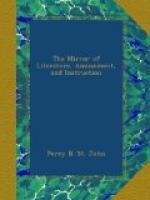Goethe remained single till his fifty-eighth year, when he married his housekeeper, by whom he had a family. His affection for his son, who died about two years since, was unbounded. After his death, Goethe was but the shadow of that which he once had been. To his daughter-in-law he was indebted for that tenderness and assiduity which soothed his declining years. When upwards of eighty years of age, he meditated literary projects with the vigour and enthusiasm of youthful genius. Indeed, his constitution was unimpaired, and seemed to promise some years of life: his death therefore excited at Weimar, a feeling of surprise as well as sorrow.
The last moments of Goethe were those of an unbroken mind—a bright light waning and glimmering out. He had not the slightest presentiment of his death. About a week before, he caught cold, which brought on a catarrh. It was thought that his powerful constitution was unattacked. He conversed with great serenity, particularly upon his theory of colours, which so powerfully occupied his mind to the last moment of his existence. On the evening of March 21, he explained to his daughter the conditions of the peace of Basle; desired that the children should be taken to the theatre; and said that he was much better; he requested that Salvandy’s Sixteen Months might be handed to him, although his physician had forbidden him all laborious occupation; but the doctor having gone out for a few moments, he ordered lights to be brought, and attempted to read. Not being able to do so, he held the book for some moments before him, and then said, “Well, let us do at least as the Mandarins do:” he fell asleep, and his slumbers appeared light and refreshing. Next day he conversed cheerfully with his daughter, his grandchildren, and some friends. “At seven o’clock he desired his daughter to bring him a portfolio, to enable him to illustrate some phenomena of colouring, and he began with his right hand to trace some characters in the air. Towards ten o’clock he ceased almost entirely




